This post contains affiliate links. Please see our disclosure policy.
Have you ever wondered what adding olive oil to sourdough bread will do?
There are many times when adding olive oil to sourdough is actually beneficial to your bake. It’s also a use ingredient for making vegan friendly sourdough.
But when do you add it? And how much do you add?
This blog will explain the reasons to add olive oil to your sourdough bread, as well as how to do it effectively.
Table of Contents
- When To Add Olive Oil to Sourdough Bread Dough?
- The Effect of Olive Oil on Sourdough Bread
- How Much Olive Oil Should You Add to Sourdough Bread?
- What Happens If You Put Too Much Olive Oil In Sourdough Bread?
- How Does Olive Oil Affect Sourdough Hydration?
- Can You Substitute Butter for Olive Oil in Sourdough Bread?
- What Other Oils Can You Substitute For Olive Oil
- Frequently Asked Questions
- Further Reading
When To Add Olive Oil to Sourdough Bread Dough?
Ideally, olive oil should be added after the autolyse (or fermentolyse).
This means that you would complete the autolyse (or fermentolyse) and then gently incorporate the olive oil into the dough.
If using my simple sourdough recipe, add the oil as you form the dough into a ball (step 3).
Olive oil (or indeed any fat) added to sourdough actually coats the gluten forming proteins in the flour.
As you know, oil and water are not friends. So the oil actually repels the water away from the flour, stopping it from being able to effectively form a gluten network.
Adding the oil after the autolyse means that the dough has had some time to begin forming the gluten network.

The Effect of Olive Oil on Sourdough Bread
One of the most common reasons for olive oil to be added to sourdough bread is to soften the crust. It is most effective for this purpose.
Adding olive oil to sourdough bread has other effects too:
- Softens sourdough crust
- Produces a softer, tighter crumb (inhibits gluten network)
- Heightens the flavor of sourdough bread
- Can increase shelf life
Depending on your tastes, these effects could be a positive or a negative.
For example, adding fats to a sandwich loaf produces a much softer, tighter crumb. This is desirable.
However, if you want a more open crumb sourdough, the effects of adding olive oil to your dough may not be welcome.
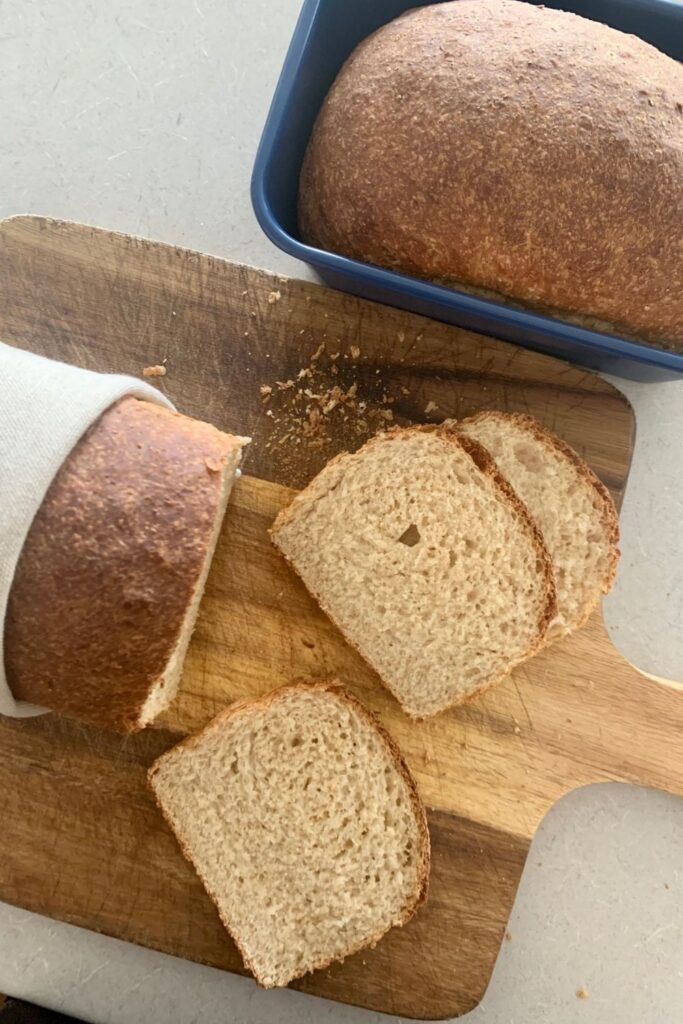
How Much Olive Oil Should You Add to Sourdough Bread?
You really don’t need a lot of olive oil in your sourdough to have an effect.
In general adding between 2 – 20% (baker’s percentage) of olive oil will be sufficient.
Just be aware that the more you add, the more of an effect it will have on your dough.
Here’s a breakdown of how much oil you would add in grams and %
| Amount of flour | % of Olive Oil | Olive Oil in Grams |
| 500g | 2% | 10g |
| 500g | 4% | 20g |
| 500g | 5% | 25g |
| 500g | 10% | 50g |
| 500g | 15% | 75g |
| 500g | 20% | 100g |
If you need help with baker’s percentages, you’ll find a guide to baker’s math here.
What Happens If You Put Too Much Olive Oil In Sourdough Bread?
If you put too much olive oil into sourdough bread it will severely inhibit and damage the gluten network.
This, coupled with the higher hydration of your dough, will cause it to be wet and sticky and very hard to work with.
The dough will be soft and unworkable.
If you add the olive oil during the autolyse process, it will have an effect on the dough’s ability to form a gluten network.
Generally when you start stretching and folding sourdough, you feel the dough begin to strengthen with each stretch. When too much oil is added, the dough will remain loose and unworkable.
The only way to fix it would be to add some more flour, however you would need work the dough longer to encourage the gluten network to develop (given that some of the flour will be already coated with the oil).
How Does Olive Oil Affect Sourdough Hydration?
Generally, fats are not said to affect the hydration of sourdough bread.
However, olive oil is a fat in liquid form, so it will add liquid to the dough, in turn, increasing the hydration.
If you’re at the beginning of your sourdough journey and you’re not wanting to deal with an increase in hydration, I would advise you to decrease the amount of water you add to your dough by the amount of olive oil you use.
Alternatively, you could add the same weight in flour to your dough.
This will ensure that it remains easier to handle.
For example, if you’re using my simple sourdough recipe, you could add 20g of olive oil and reduce the water to 330g.
I would certainly add no more than 10% olive oil if you are a beginner.
If you are more intermediate in your journey, you can experiment with a higher percentage of olive oil. See how it affects the way your dough feels and shapes.
You can find the perfect amount of olive oil this way.
Once you understand how the olive oil affects the dough, you are better able to work with it.
Can You Substitute Butter for Olive Oil in Sourdough Bread?
Yes you can substitute butter or even vegan butter for olive oil in sourdough bread. It has much the same effect on the dough as olive oil does.
The one difference with butter is that it can exist as a solid and as a liquid.
The state in which you use butter will depend on what type of bread you are making.
If you are adding butter to traditional sourdough, it would be better melted so you could fold it in after autolyse/fermentolyse (or try this sourdough buttermilk bread). Alternatively, you can add grated butter to your sourdough like this sourdough croissant bread.
If you are making a sandwich loaf, it would be fine to add it, albeit slightly softened, but still in a solid state.
It’s much easier to knead butter into a sandwich loaf with a stand mixer.
Be aware that if you are swapping butter for olive oil, you’ll need to take into consideration the liquidity of the olive oil.
Many people ask if they can add olive oil into this sourdough sandwich loaf for example. Swapping the butter for olive oil can make the dough very wet and unworkable though so you would need to reduce the water content.

What Other Oils Can You Substitute For Olive Oil
If you want to use a different oil in your sourdough bread, you can look at some olive oil alternatives.
Each oil will bring their unique flavor profile to your bake so you will need to find one that you enjoy.
Some good alternatives are:
- Avocado Oil
- Macadamia Oil
- Walnut Oil
Be careful with any oil flavored with garlic because of the way in which garlic can hamper fermentation.
Frequently Asked Questions
Yes you can brush the top of your sourdough bread with olive before baking. This can give you a more golden color and enhance the flavor of the crust.
Yes – adding olive oil to sourdough bread will result in a softer crust and crumb. The oil as a lipid coats the flour and inhibits the gluten network resulting in a softer, tighter crumb and softer crust. This can be a desirable outcome if you do not like tough, chewy sourdough crusts.
This is really personal preference. You could add plain olive oil or flavored olive oil (just be careful with garlic oil as it can inhibit fermentation completely). Extra virgin olive oil is always a popular choice.
I would advise against this. Ideally, olive oil should be added just after the autolyse when the dough is still quite loose and you are able to easily massage it through the dough.
The olive oil will coat the flour and repel the water meaning that the gluten development will be inhibited. While it is not ideal to do it this way, if you do add olive oil at the beginning of the process, you will need to complete additional stretch and folds to ensure that the dough becomes workable.
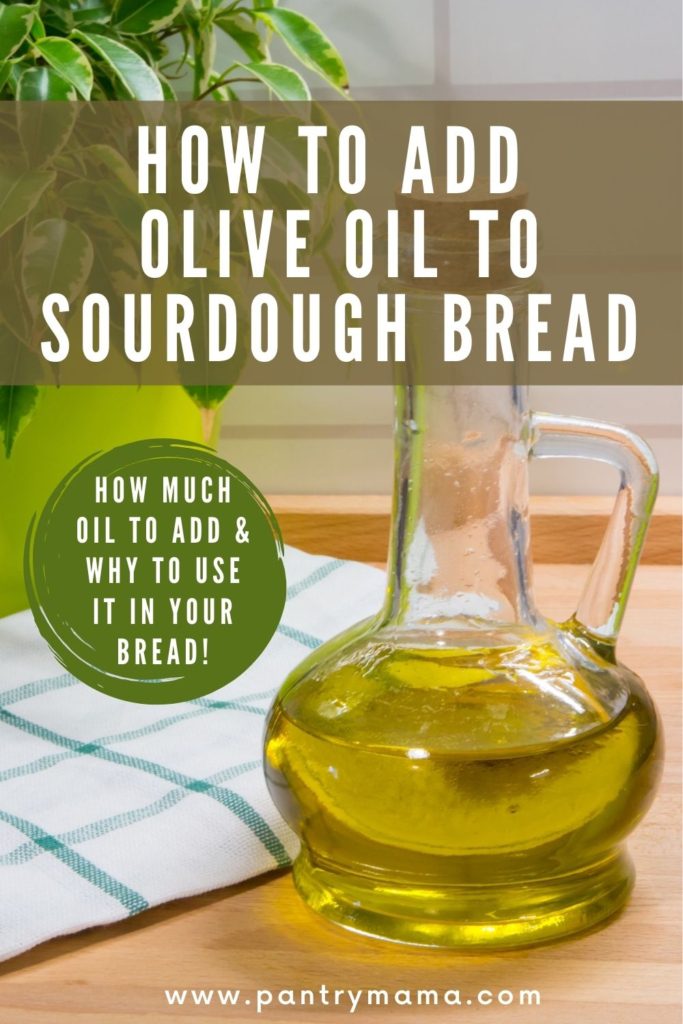
Further Reading
If you enjoyed reading about the effects of olive oil on sourdough bread, you might enjoy these ideas:
- How to Make Your Sourdough Crust Softer and Thinner
- Adding Sugar to Sourdough Bread – Is it necessary?
- Can You Add Honey to Sourdough Bread?

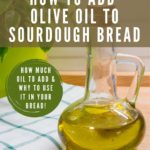

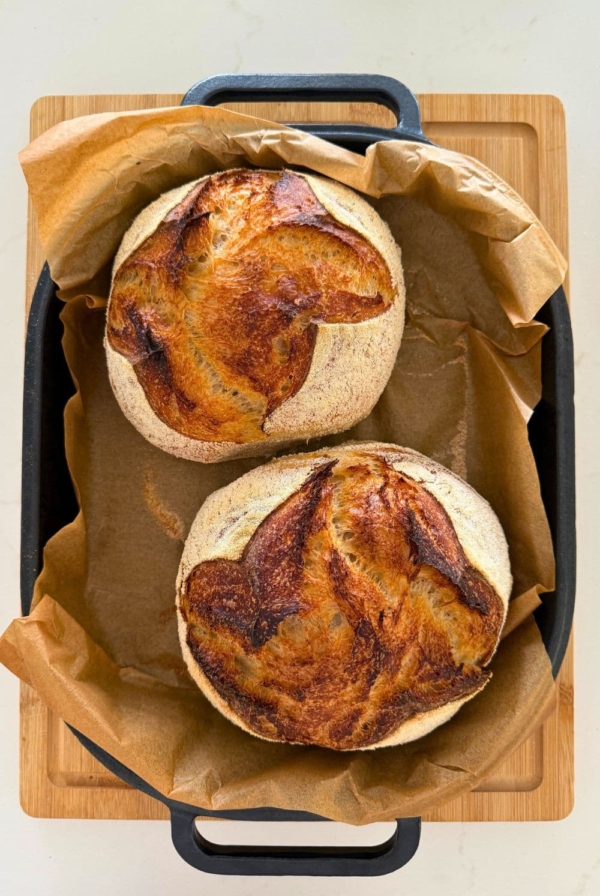
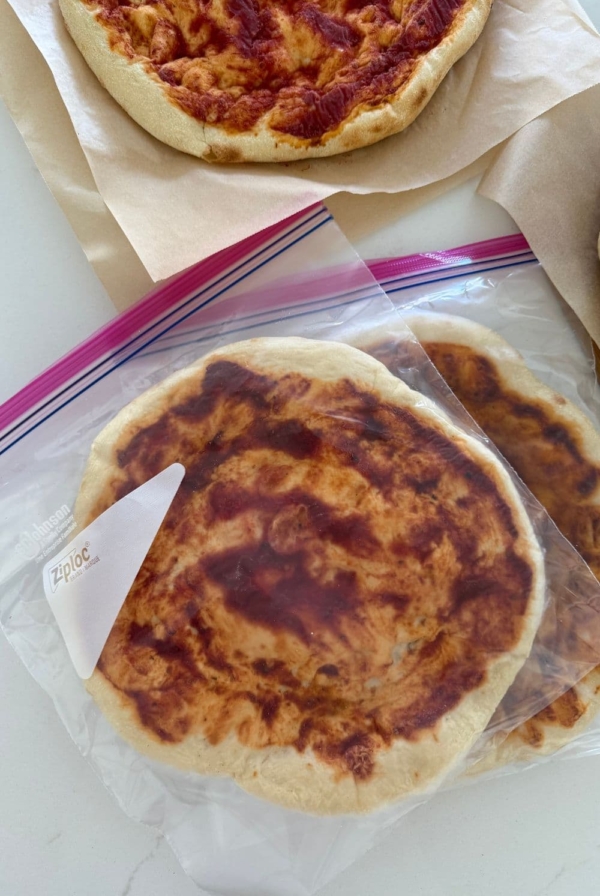






Hi. How does one change the type of fat they are using in their bread? Like, if a recipe calls for 30g Olive oil, how can I convert that Olive oil to softened Butter?
If it calls for 50g softened Butter, I wouldn’t use 50g of Oil….would I?
Do I have to include the water content in Butter?
Thanks
I’m strongly considering using butter rather than adfing olive oil. How much butter should I use for 500g of flour?
Hello,
How many grams of avocado oil should I add in this recipe: 450g flour 300g water 100 g starter 10 g salt?
Thank you kindly
Hi there. Looked for a softer crust and came across this! Does adding the oil make it more gluten? I’m making it for someone who is gluten sensitive but have heard sourdough can be ok for them. Just wondering if the olive oil makes it more or less since you say in inhibits gluten development
Thank you
Are you not concerned about the degradation of the olive oil due to its smoke point? Can you elaborate on how it is safe to use olive oil in breads that bake at a higher temperature than the smoke point of the oil? I love using olive oil when I’m cooking at lower temperatures, but I’m not sure I understand the science behind it being ok to bake it at such a higher temperature. Just want to keep families safe 🙂
After the autolyse, I have been adding a cube of soft butter to 1000g of all-purpose flour (+650g water and 20g salt). However the recipe I follow suggests adding butter a Tbsp at a time with the stand mixer running. Would I do olive oil the same way OR all at once?
It really depends on your mixer. With my KitchenAid, it doesn’t love oil or butter all at once so I have to add it bit by bit. With my Thermomix or Ooni Halo Pro I can add it all at once with no issues. It’s really up to you and your mixer. Just watch your dough, see how it behaves and adjust accordingly 🙂